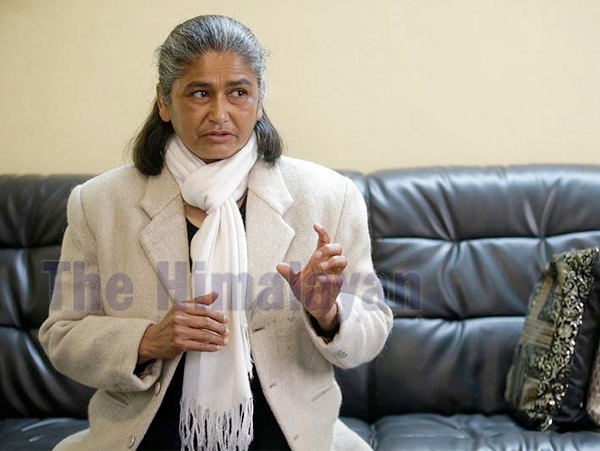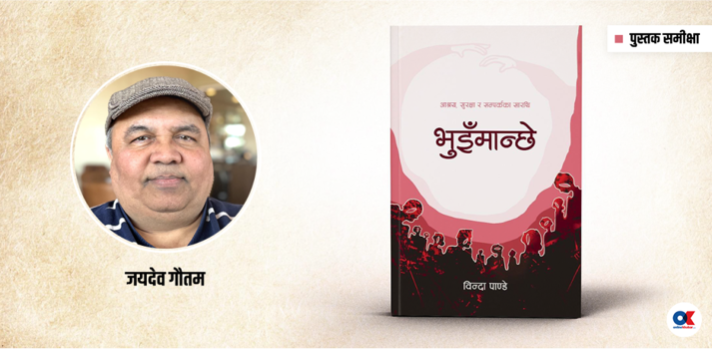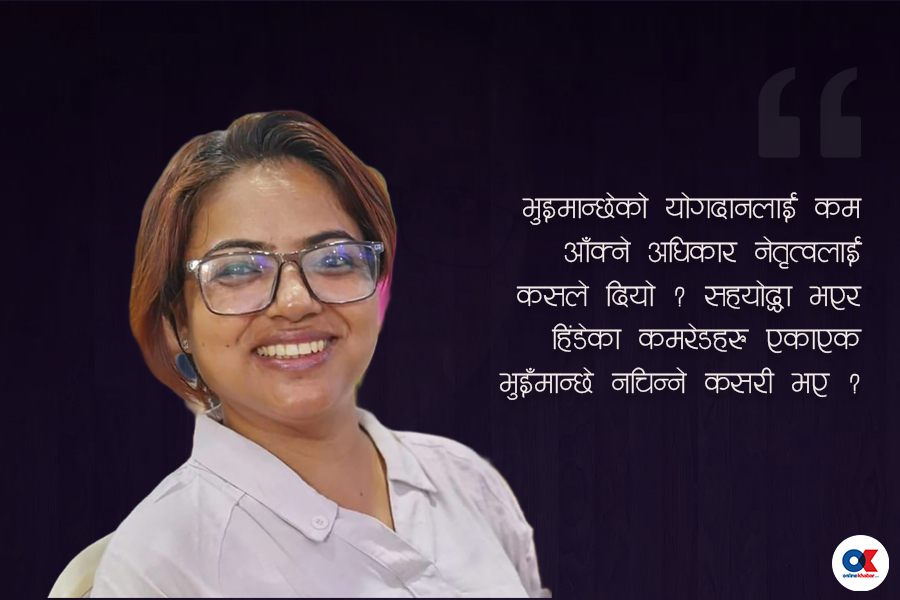The Honorable Binda Pandey is a Constituent Assembly member from CPN-UML. She is also Chairperson of CA’s Committee on Fundamental Rights and Directive Principle and the central committee member of CPN-UML. She got into politics from 1981 from her school days and since then she has not looked back and has been raising her voice against injustice and discrimination and calling for an end to inequality among women and men.
The CCD interviewed Pandey to get some insights about her involvement in politics and her contribution in constitution making process.
 CCD: Can you please give me an insight into your background? How did you get into politics? (Inspiration)
CCD: Can you please give me an insight into your background? How did you get into politics? (Inspiration)
Pandey: I was born and brought up in a rural area of Nepal. I feel that my involvement in politics was the result of positive inspirations that I took from the negative aspects of the society. The attitude towards women by the family and the society, and discrimination and exploitation of women, became my first source of inspiration to join politics. Even though I was born in a rural area I got an opportunity to go to school due to a family environment different compared to that of other girls of my age. It was possible only through my parent’s positive attitude as they were of the opinion that children should receive education as long as the circumstance and economic situation permits. Besides, my elder brothers were highly educated. My first active involvement in politics began since my participation in the Nepal bandh or general strike held during my school days on March 27, 1981. The All Nepal National Free Students Union, a student wing of CPN-UML had organised the protest pogramme against injustice and discrimination and calling for an end to inequality among women and men. I joined the protest programme to raise voice against injustice and unequal treatment against women.
Time passed and with increasing involvement in the movement for the rights and well-being of women, labors and the general public at large, I felt that it is not enough to raise voice only from the field and is eqully important to be at the decision-making level in order to bring about positive change in practise. That is why I joined party politics. As a result of which, I am now the party’s central committee member and in the Constituent Assembly where the country’s new constitution is being made.
CCD: Would you like to share with us the impact of your active political life on your family life?
Pandey: If politics is to be understood as a medium of social change and if it is to be used in the interest of the general public then this is the greatest form of social service. Every individual who wants to join politics must understand that when you are involved in this sector, it will invite various kinds of problems at the individual, family and social level. Otherwise it is not easy to sustain and continue in this sector. If we do not understand that one’s involvement in this sector is not to make any individual gains but to contribute collectively, then politics cannot maintain its terms and conditions.
Involvement in politics is entirely different than the involvement in vocational work or any profession carried out for daily livelihood based on individual strength or knowledge. Politics does not move ahead in an easy, efficient and regular manner like a business or profession, and if one expects that kind of life here that it would be difficult to sustain in this sector. As I accepted all these facts in practical terms and mentally, I had no complaints about what I faced at the family or individual level, and thereby should not be considered unnatural as well.
Looking at the involvement of the past three decades and the kind of changes that have taken place during the period in the life of women, the proletariat and the general Nepali people I would conclude that the investment made in an individual basis was productive. There is nothing to regret of.
CCD: Being a chairperson of Committee on Fundamental Rights and Directive Principle, what are the major issues that you have been advocating for to be included in the fundamental rights?
Pandey: The responsibility of carrying out the duties of the Committee Chair would not be emphasizing on one’s own issues but rather work to coordinate and facilitate addressing the demand and expectations of the movements in the past and to draft the concept paper and report based on Nepal’s international committments and the recommendations of the people and by incorporating the opinion of the Committee members.
And I feel that I carried out that role as the Committee Chair. In course of drafting the fundamental rights, all of us emphasized and agreed on guaranteeing fundamental political, economic, social and cultural rights essential for a dignified human life, and by also fulfilling the human needs from the birth of a citizen to the point of elderly. And to a extent I think we have been able to do so. The draft upon its release has also won positive remarks from the stakeholders on the provisions relating to the general public and class/communities.
As far as the directive principles and policies of the State is concerned and in the context of basically making Nepali society a welfare state, the notion that no matter who is in the government tomorrow they have to be guided by the principles and policies of the State has been reflected. In the present context where the directive principles and policies of the State is yet to be discussed, a provision has been made whereby following the promulgation of the new Constitution, the Government has to table a periodic progress report and discussions would be held based on the report at the parliament. A proposal has also been made to provide for a Committee at the Parliament for its monitoring. This is an entirely new proposal and it would would as a guideline for ensuring that the work of the Government is as per the constitution.
CCD: Can you share your experience on how you advocated on citizenship issues? (with examples if possible?)
Pandey: Whatever we talk about the constitutional rights, the citizen’s identity is the first basis to enjoy them. Unless the equal status is ensured among all citizens regarding the citizen’s identity, equal provisions in any other area only cannot ensure equality. Therefore, the Committee on Fundamental Rights and Directive Principles has considered principle of non-discrimination as the main basis for the provisions related to the citizenship that are to be included in the new Constitution.
Equal status to both father and mother has been established in providing citizenship to the child by recognizing both father and mother as the source of decent thereby changing the tradition of considering only the father as the origin of decent in practice regardless of any documented provision for acquiring the citizen identity by the child.
Similarly, in case of citizenship entitlements to a person married to a foreign national there is the provision that a foreign woman married to a Nepali man may acquire naturalized citizenship soon after the marriage, whereas, a Nepali woman, married to a foreign man, would not retain the same status of a citizen. As a result, the committee reformed this provision to ensure equal provision for both a Nepali man and a woman married to a foreign national. However, an agreement later made in the Sub-committee comprising the top leaders ignored the principle of non-discrimination has reversed the provision to make it unequal again. As a result, this is now under dispute.
CCD: What do you think about the concept of formation of the caucuses? Since there is Women and Indigenous nationalities caucus, how about Youth CA caucus? Why do you think the caucuses are important?
Pandey: There are several caucuses formed inside the Constituent Assembly including that of women, dalit, madhesi, and indigenous groups. It is good to have discussion among the CA members of the concerned community in one (common) place. But, even though there are 50 per cent women in every community and one third women members in the Constituent Assembly, the women issues have not become a matter of concern in those groups and even if any issue is raised, it is usually sidelined stating that it is a women’s issue. This is not a good tendency. The role of such groups would be significant if they work by incorporating the sentiment and needs of the respective community. However, if the group run only after personal ambition, there will be no attraction and significance of the group. And it has already been observed now in many caucuses.
A youth CA caucus is yet to be formed even after a series of efforts to do so. I think, it is because of ambiguity in its composition, role and objective. On the other hand, youth are still stuck with the tendency of being led rather than to lead. It is another reason. If youth participation and role is to be sought in the politics, it is essential to change such tendency and the youth should come forward in the leadership role.
CCD: Lastly, how hopeful are you about the having the draft Constitution within the extended time frame? What do you think is the main reason behind the delay in constitution making process?
Pandey: The contentious issues have been narrowed down and consensus was reached in many issues during the first extension of the Constituent Assembly. However, the later extended period was not utilized in any way.
Everybody realizes that lack of time was not the reason for the draft of the constitution not being completed. Until the peace process reaches to a conclusion, the extension of time will not work. Therefore, everybody should understand that the reason behind non-promulgation of the constitution is not the CA, but the inability to speed up the peace process and the issue of ledership of the government and exert pressure in this regard. If there is no progress in the peace process during this period, there will be no draft as well. It is very painful to me as a CA member, and it is betrayal and insult of the blood and sweat that the people sacrificed to become a sovereign citizen caused due to lack of political farsightedness.
http://www.ccd.org.np/index.php?action=interview&conid=23




